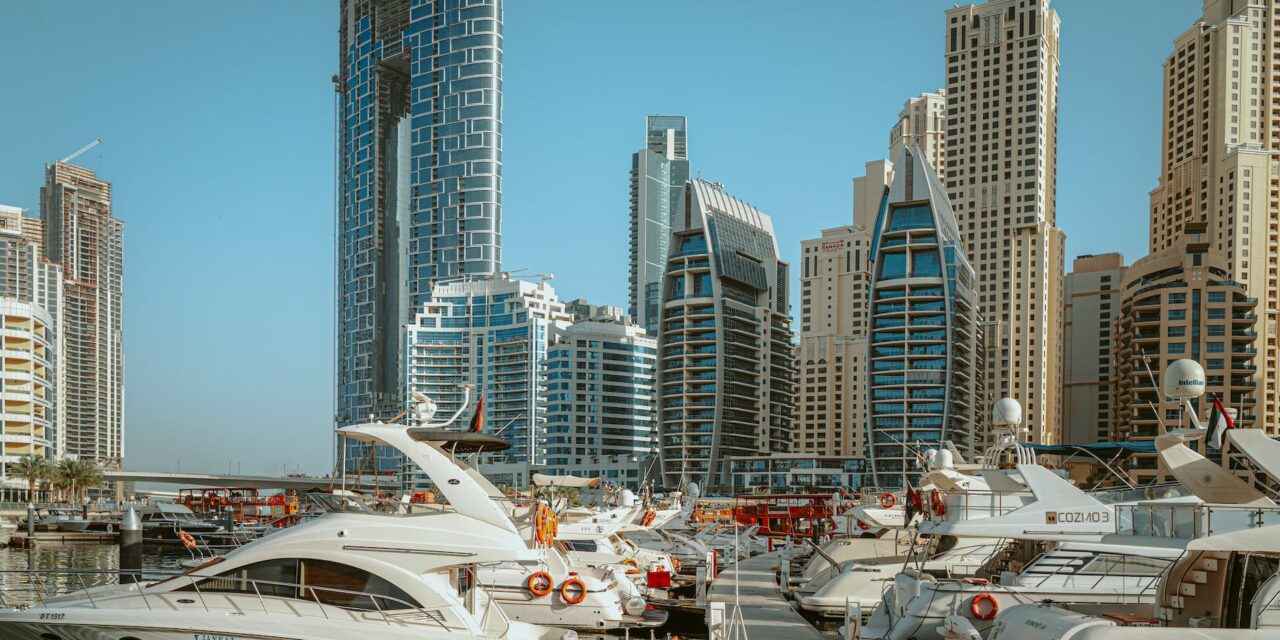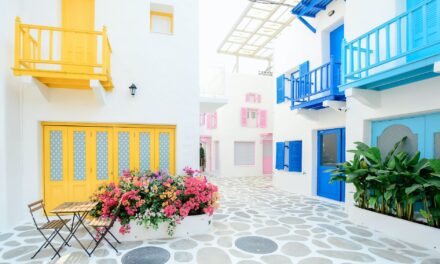Dubai is a city that has been making waves in recent years as it continues to grow and develop at an astonishing pace. With its towering skyscrapers, luxurious shopping centers, and a thriving economy, Dubai is quickly becoming one of the most important cities in the world. In this article, I will be discussing some of the most important facts about Dubai that you need to know.
Dubai is located in the United Arab Emirates (UAE) and is one of the seven emirates that make up the country. It is situated on the southeast coast of the Persian Gulf and is bordered by Abu Dhabi to the south, Sharjah to the northeast, and Oman to the southeast. The city has a strategic geographical location that has made it a hub for trade and commerce for centuries.
Dubai has a rich historical background that dates back to the early 18th century. It was once a small fishing village but has since transformed into a bustling metropolis that is home to over 3.57 million people. The city has become a melting pot of cultures, with people from all over the world coming to live and work in Dubai. In the next section, we will delve into some of the key facts about Dubai that make it such an important city today.
Key Takeaways
- Dubai is a city located in the United Arab Emirates (UAE) that has a strategic geographical location on the southeast coast of the Persian Gulf.
- The city has a rich historical background and has transformed from a small fishing village to a bustling metropolis that is home to over 3.57 million people.
- Dubai is an important city today due to its thriving economy, cultural significance, tourism, infrastructure, education and healthcare, political structure, and environmental initiatives.
Geographical Location
Dubai is located on the eastern coast of the Arabian Peninsula, in the southwest corner of the Arabian Gulf. The city is situated at 25.2697° N, 55.3095° E and is the largest city in the United Arab Emirates (UAE). It shares borders with the emirates of Abu Dhabi to the south, Sharjah to the northeast, and Oman to the southeast.
Dubai is the second-largest emirate, covering an area of approximately 4,114 square kilometers (1,588 square miles). The city itself covers an area of about 3,885 square kilometers (1,500 square miles). The emirate is roughly rectangular in shape, with a coastline stretching 72 kilometers (45 miles) along the Persian Gulf.
Dubai’s location on the Persian Gulf coast gives it a tropical desert climate, with hot and humid summers and mild winters. The average temperature in Dubai ranges from 19°C (66°F) in January to 36°C (97°F) in August.
Dubai is also home to an exclave called Hatta, which is located about 115 kilometers (71 miles) east of Dubai in the Hajjar Mountains. Hatta is a popular tourist destination known for its scenic beauty and outdoor activities, such as hiking, mountain biking, and kayaking.
Overall, Dubai’s geographical location makes it an important hub for trade and commerce, as well as a popular tourist destination. Its strategic location on the Arabian Gulf has helped it become a major player in the global economy, while its warm climate and beautiful scenery attract millions of visitors each year.
Historical Background
Dubai has a rich history that dates back to the pre-Islamic era. The area where Dubai is situated was believed to be a part of a pre-Islamic community led by the Sassanian Empire from the 3rd century AD. Later in the 7th century AD, the Umayyad Caliph Group occupied the region and introduced Islam here 1.
In 1833, Maktoum bin Butti of the Bani Yas tribe led his people to the Shindagha Peninsula at the mouth of Dubai Creek. He settled there and declared the town’s independence from Abu Dhabi. From then onwards, Dubai was regarded as a fishing village 2.
During the 19th century, Dubai was a hub for the pearl industry and was one of the major trading ports in the Persian Gulf. The city’s strategic location on the trade routes between Europe, Asia, and Africa contributed to its growth as a trading center 3.
In 1892, the British protectorate treaty was signed between the sheikhdoms of the Persian Gulf and Britain. Dubai was one of the sheikhdoms that signed the treaty with Britain, which provided protection against piracy and ensured the security of trade routes 4.
After the discovery of oil in the 1960s, Dubai’s economy shifted from a trading-based economy to an oil-based economy. The government invested heavily in infrastructure and modernization, which led to the rapid growth of the city 5. Today, Dubai is a thriving metropolis and a major tourist destination in the Middle East.
Footnotes
Economic Overview
Dubai’s economy is one of the most diversified in the Middle East, with a strong focus on trade and tourism. As of 2022, Dubai’s per capita gross domestic product is $46,665, making it one of the wealthiest cities in the world [1]. In this section, I will provide an overview of Dubai’s economy, including its diversification and role in global trade.
Dubai’s Diversified Economy
Dubai’s economy has undergone significant diversification in recent years, moving away from its traditional reliance on oil. Today, the city’s economy is driven by a variety of sectors, including real estate, finance, tourism, and trade. The government has implemented a number of policies to encourage diversification, including the establishment of free trade zones, which offer tax incentives and other benefits to businesses operating in the city.
Dubai’s real estate sector has been a major driver of economic growth in recent years, with a number of large-scale development projects underway. The city is also home to a number of world-class financial institutions, including the Dubai International Financial Centre (DIFC), which has become a hub for banking and finance in the region.
Role in Global Trade
Dubai’s strategic location and well-developed infrastructure have made it a major player in global trade. The city is home to one of the world’s busiest ports, Jebel Ali Port, which handles more than 19 million twenty-foot equivalent units (TEUs) of cargo annually [2]. Dubai’s airport, Dubai International Airport, is also one of the busiest in the world, with more than 90 million passengers passing through each year [3].
Dubai’s free trade zones have also played a significant role in the city’s trade growth. These zones offer businesses a number of benefits, including 100% foreign ownership, zero taxes on imports and exports, and no restrictions on repatriation of profits. As a result, Dubai has become a hub for regional trade, with many businesses using the city as a base for their operations in the Middle East and beyond.
In conclusion, Dubai’s economy is one of the most diversified in the Middle East, with a strong focus on trade and tourism. The city’s strategic location and well-developed infrastructure have made it a major player in global trade, with a number of world-class ports and airports. The government’s policies to encourage diversification, including the establishment of free trade zones, have also been key to the city’s economic success.
[1] Source: Wikipedia
[2] Source: Port of Jebel Ali
[3] Source: Dubai Airports
Cultural Significance
Dubai is a city that is steeped in culture and tradition. As a melting pot of different nationalities, the city has a unique and diverse cultural landscape that is reflected in everything from its architecture to its cuisine. In this section, I will explore the cultural significance of Dubai, with a focus on its Emirati heritage and multicultural society.
Emirati Heritage
Dubai’s Emirati heritage is an important part of its cultural identity. The city has a rich history that dates back to the pre-Islamic era, and this is reflected in its architecture, customs, and traditions. One of the most iconic symbols of Emirati culture is the traditional dress, which includes the kandura for men and the abaya for women. These garments are not only practical in the desert climate but also serve as a symbol of national identity and pride.
Another important aspect of Emirati heritage is the Arabic language. While English is widely spoken in Dubai, Arabic is the official language of the United Arab Emirates, and it is deeply ingrained in the culture and daily life of the city. Visitors to Dubai can immerse themselves in the local culture by learning a few basic Arabic phrases and exploring the city’s many cultural attractions, such as the Dubai Museum and the Sheikh Mohammed Centre for Cultural Understanding.
Multicultural Society
Dubai’s multicultural society is one of its greatest strengths. With over 200 nationalities represented in the city, Dubai is a truly global hub of culture and diversity. This is reflected in everything from the cuisine to the fashion, with influences from all over the world blending together to create a unique and vibrant cultural scene.
One of the best ways to experience Dubai’s multicultural society is through its food. From traditional Emirati dishes like machboos and luqaimat to international cuisine like sushi and pizza, Dubai’s culinary scene is a reflection of its diverse population. Visitors to Dubai can explore the city’s many restaurants and food markets to sample the best of what the city has to offer.
In conclusion, Dubai’s cultural significance is a reflection of its rich history and diverse population. Whether exploring the city’s Emirati heritage or immersing oneself in its multicultural society, there is something for everyone in this vibrant and dynamic city.
Tourism
Dubai is a popular tourist destination, attracting millions of visitors every year. The city offers a variety of attractions, from luxurious shopping centers to stunning landmarks.
Famous Landmarks
Dubai is home to several famous landmarks that are worth visiting. The Burj Khalifa, the tallest building in the world, is a must-see attraction. Visitors can take a trip to the observation deck on the 124th floor to enjoy breathtaking views of the city.
Another popular landmark is the Palm Jumeirah, an artificial island in the shape of a palm tree. It is home to several luxury hotels, including the Atlantis, The Palm, and the Waldorf Astoria Dubai Palm Jumeirah.
The Dubai Mall is another famous landmark that attracts visitors from all over the world. It is the largest mall in the world and offers a variety of entertainment options, including an aquarium, an ice rink, and a cinema.
Tourist Activities
Dubai offers a range of activities for tourists to enjoy. One of the most popular activities is desert safari. Visitors can take a trip to the desert and enjoy dune bashing, camel riding, and a traditional Bedouin-style dinner.
Another popular activity is visiting the Dubai Miracle Garden, the world’s largest flower garden. The garden features over 45 million flowers arranged in various shapes and patterns.
For those interested in water sports, Dubai has several options, including jet skiing, parasailing, and flyboarding. Visitors can also take a trip to the Dubai Aquarium and Underwater Zoo, which features a 10 million-liter tank and over 140 species of aquatic animals.
Overall, Dubai offers a variety of attractions and activities for tourists to enjoy. From famous landmarks to thrilling activities, there is something for everyone in this vibrant city.
Infrastructure
Dubai is known for its impressive infrastructure, which includes modern transportation systems and stunning architecture. In this section, I will discuss two sub-sections that highlight the key aspects of Dubai’s infrastructure: Transportation and Architecture.
Transportation
Dubai has a well-developed transportation system that includes buses, taxis, and trains. The Dubai Metro is a driverless, fully automated metro network that runs along two lines and covers a total of 75 kilometers. The metro system is connected to the Dubai Tram, which runs along a 10.6-kilometer track and serves the areas of Dubai Marina and Jumeirah Beach Residence. The Dubai Bus network is also extensive, with over 100 routes covering the entire city.
Dubai is also home to one of the busiest airports in the world, Dubai International Airport. In 2019, the airport served over 86 million passengers, making it the fourth-busiest airport globally. Dubai is also building a new airport, the Al Maktoum International Airport, which is expected to become the world’s largest airport when completed.
Architecture
Dubai is famous for its stunning architecture, which includes some of the tallest buildings in the world. The Burj Khalifa, which stands at 828 meters tall, is the world’s tallest building. The building has 163 floors and features a mix of residential, commercial, and hotel spaces.
Another iconic building in Dubai is the Burj Al Arab, a luxury hotel that stands on an artificial island. The hotel is shaped like a sail and is one of the most recognizable buildings in the world. Dubai is also home to the Dubai Mall, the world’s largest shopping mall, which features over 1,200 stores, an aquarium, and an ice rink.
Dubai’s infrastructure is a testament to the city’s commitment to innovation and progress. The transportation system and architecture are just a few examples of the city’s impressive infrastructure, which has helped make Dubai one of the most popular tourist destinations in the world.
Education and Healthcare
Dubai has made significant strides in both education and healthcare. The government has invested heavily in both sectors to ensure that the residents have access to high-quality services.
Education
Dubai has a well-developed education system that offers a range of options for families. There are public and private schools, as well as international schools that offer a variety of curriculums. The education system is overseen by the Knowledge and Human Development Authority (KHDA), which ensures that schools meet high standards of quality.
One of the most notable aspects of the education system in Dubai is its emphasis on technology. Many schools use the latest technology to enhance the learning experience. Additionally, Dubai has a number of universities and colleges that offer world-class education.
Healthcare
Dubai’s healthcare system is a mix of both public and private sectors. The government has made significant investments in healthcare infrastructure, including hospitals and clinics. There are both public and private hospitals in Dubai, and many of them are staffed by highly trained medical professionals.
Dubai’s healthcare system is known for its high standards of quality. The government has implemented strict regulations to ensure that all healthcare providers meet these standards. Additionally, Dubai has a number of specialized hospitals and clinics that offer advanced treatments and procedures.
Overall, Dubai’s education and healthcare systems are among the best in the world. The government’s investments in these sectors have paid off, and residents have access to high-quality services.
Political Structure
Dubai is one of the seven emirates that make up the United Arab Emirates (UAE). The UAE is a constitutional federation with a unique political system. The political structure of Dubai is based on the UAE’s Constitution, which defines the powers of the federal government and the individual emirates.
The UAE is a federation of seven emirates, each with its own ruler and government. The rulers of the seven emirates form the Federal Supreme Council, which is the highest legislative and executive body in the country. The council is responsible for making federal laws, approving the federal budget, and appointing the prime minister and cabinet.
Dubai’s ruler, Sheikh Mohammed bin Rashid Al Maktoum, is also the Vice President and Prime Minister of the UAE. He is responsible for the day-to-day running of the emirate, including its economic and social development. The government of Dubai is composed of several ministries and departments, each responsible for a specific area of governance.
The political system of Dubai is characterized by a strong emphasis on stability and continuity. The emirate’s leadership has implemented several measures to ensure that the political system remains stable and effective. These measures include a strong emphasis on consensus-building, a commitment to economic development, and a focus on maintaining good relations with other countries in the region and beyond.
Environmental Initiatives
Dubai has made significant strides in recent years to reduce its ecological footprint and promote sustainable development. The government has implemented several initiatives aimed at reducing carbon emissions, conserving energy, and preserving natural resources.
One of the most notable initiatives is the Dubai Clean Energy Strategy 2050. This strategy aims to make Dubai a global leader in clean energy by increasing the share of clean energy in the emirate’s total energy mix to 75% by 2050. This will be achieved through the implementation of several projects, including the Mohammed bin Rashid Al Maktoum Solar Park, the largest single-site solar park in the world.
Dubai has also implemented several initiatives aimed at reducing water consumption, such as the Dubai Integrated Water Resource Management Strategy. This strategy aims to reduce water demand by 30% by 2030 through the implementation of several measures, including the use of treated wastewater for irrigation and the promotion of water-efficient technologies.
In addition to these initiatives, Dubai has also launched several projects aimed at reducing waste and promoting recycling. One of the most significant projects is the Dubai Zero Waste Project, which aims to divert 75% of the emirate’s waste away from landfills by 2021. The project includes several measures, such as the implementation of waste segregation at source, the promotion of recycling, and the construction of waste-to-energy plants.
Overall, Dubai’s environmental initiatives demonstrate the government’s commitment to promoting sustainable development and reducing the emirate’s ecological footprint. These initiatives have not only helped to preserve natural resources but have also contributed to Dubai’s reputation as a global leader in sustainability.
Frequently Asked Questions
What are some interesting facts about Dubai’s history?
Dubai has a rich and fascinating history that dates back to the pre-Islamic era. The city was originally a small fishing village and has grown rapidly over the past few decades. One interesting fact about Dubai’s history is that it was once a major trading hub for pearls, which were harvested from the nearby waters. Another interesting fact is that Dubai’s first skyscraper, the Dubai World Trade Centre, was built in 1979 and was the tallest building in the Middle East at the time.
What are some lesser-known facts about Dubai?
Dubai is known for its luxury and opulence, but there are also some lesser-known facts that make the city unique. For example, did you know that Dubai has its own version of Venice’s gondolas? Visitors can take a ride on a traditional wooden boat called an abra, which is used to cross the Dubai Creek. Another interesting fact is that Dubai is home to the world’s largest indoor theme park, IMG Worlds of Adventure.
What are some unique tourist attractions in Dubai?
Dubai is known for its impressive skyline, luxurious shopping malls, and beautiful beaches, but there are also some unique tourist attractions that visitors should check out. One of the most popular is the Burj Khalifa, the world’s tallest building. Visitors can take an elevator to the observation deck on the 124th floor for stunning views of the city. Another unique attraction is the Dubai Miracle Garden, a beautiful floral park that features over 45 million flowers.
What is the economy of Dubai like?
Dubai has a diverse and rapidly growing economy that is driven by a number of sectors, including tourism, finance, and real estate. The city is home to many multinational corporations and has a thriving business community. Dubai is also known for its free trade zones, which offer incentives for businesses to set up shop in the city.
What is the education system like in Dubai?
Dubai has a well-developed education system that offers a range of options for students. The city is home to many international schools, which cater to the expat community. There are also a number of universities and colleges in Dubai, including the American University in Dubai and the Dubai International Academic City.
What is the cultural scene like in Dubai?
Dubai is a cosmopolitan city that is home to people from all over the world. As a result, the cultural scene in Dubai is diverse and vibrant. The city is home to many museums, art galleries, and cultural centers, which showcase the rich history and traditions of the region. Dubai is also known for its annual festivals and events, such as the Dubai International Film Festival and the Dubai Shopping Festival.

























